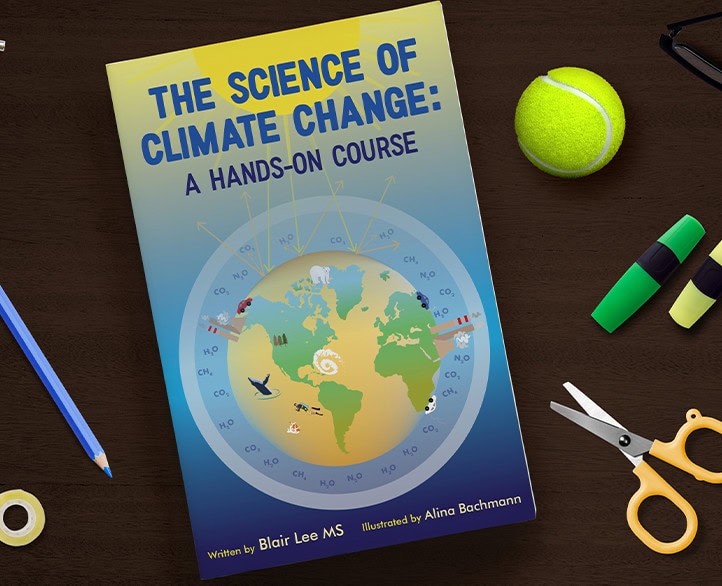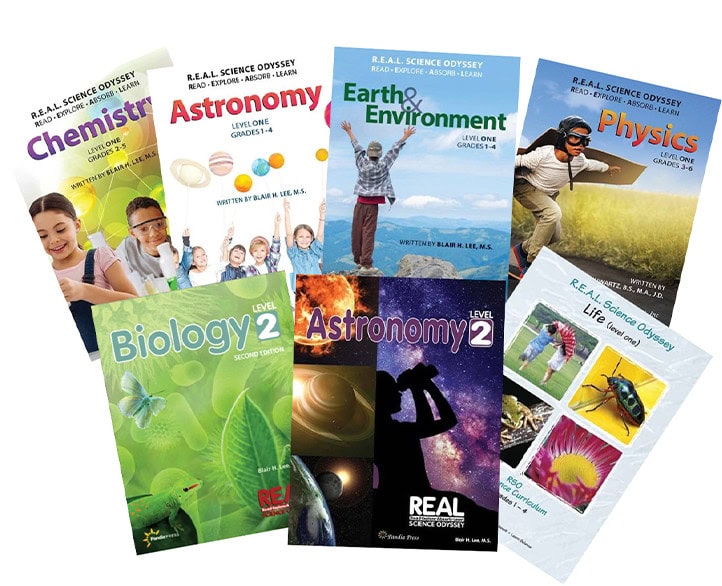Vetting Secular Science Curriculum
10 Ways to Make Sure Your Science Curriculum IS Secular
Phew! You have finally done it. You spent hours, days, and weeks planning the courses and materials you will use for your secular homeschooling during the coming year. Your excitement over planning the best year of homeschooling EVER results in you sharing your plan at a park day or on Facebook. Instead of the expected accolades, you hear from people that your choice for science isn’t secular. Wait… what? The website you purchased the science from didn’t say the science wasn’t secular. Or worse yet, the website said the materials were secular and you are now learning that is not the case. Or perhaps you are using another homeschooler’s recommendation. Whatever the reason, you now have to go back to the drawing board and figure science out, AGAIN. What is a secular homeschooler to do! Vetting secular science curriculum can be tricky, but we’ll discuss some ways you can make sure your curriculum is truly a secular science curriculum. At SEA Homeschoolers, we offer secular materials and more for your homeschool science curriculum! Be sure to check out our site and read on to learn more.
All SEA Homeschoolers Facebook groups only recommend secular academic science programs and materials.
Why Vetting a Secular Science Curriculum is Important
Secular science curriculum and materials use empirical, evidence-based information that include and present scientific facts, principles, models, and theories as recommended by a majority of practicing experts in each scientific field. Even with the extra work that vetting secular science curriculum entails, there is a good reason to ensure you are using exclusively secular science materials when homeschooling.
That reason is academic integrity. Academic integrity is the ethical policy that forms the guiding principles for what and how academic materials are presented. Companies and individuals who present themselves as entities that have the credentials to determine what people learn should be held to the highest standards of academic integrity.
From the standpoint of materials and programs that are created to teach children, academic integrity has to do with the honesty and rigor science authors use when determining what and how facts, principles, models, and theories are presented. Only science materials that are secular are developed by people who have academic integrity. Now that you know why you should put in the extra time vetting secular science curriculum, how can you make sure your homeschool science curriculum really is secular?

Vetting Secular Science Curriculum: 10 Tips to Make it Easier
We hear all the time in the Secular, Eclectic, Academic Homeschoolers Facebook group what a problem it can be to make sure the materials you choose are secular. There is obfuscation on the part of some textbook publishers and authors. There are also new materials being published regularly. Let me share some of the tips we use when we are vetting secular homeschool science curriculums.


1. Search the publisher’s website.
My favorite word to search for is evolution (but climate change and the Big Bang are good choices too). Evolution is the central thematic element that should be woven throughout biology. No secular biology course above the early elementary school level will be missing a discussion about evolution. In short: your secular science curriculum should not avoid or shy away from teaching evolution. This example from Friendly Biology shows you how this is explained by nonsecular publishers.
“What is the difference between the Christian Worldview version of Friendly Biology and the secular version of Friendly Biology?
The Christian Worldview version of Friendly Biology gives credit to God as the creator of all living things. This credit is omitted from the secular version. The theory of evolution is not included in either version as it was our goal in writing the course to present currently accepted observations of living creatures in today’s world.”
Even if you are not looking for a biology course, the omission of this word from a biology course indicates that all science materials put out by the publisher are not secular. Note the phrase “currently accepted observations.” Advocates of “observational science” will tell you that they only teach students science where the material presented in the theory can be observed. Nonsecular publishers attempting to publish a “secular” version will tell you that evolution cannot be directly observed. (Neither can climate change, the Big Bang, geologic time, or a cosmological explanation for how heavy elements are created in stars.) Anyone who writes a biology course without evolution as a thematic element of the course will not have secular chemistry, astronomy, earth science, or physics.
2. Look for science materials that advertise you can skip the chapters containing core science theories like evolution or the Big Bang without it impairing the course.
In fact, you cannot omit central concepts that are essential for making connections across disciplines without it impairing the course.
Evolution is a thematic element that gives context and meaning to the whole of biology. The Big Bang is a scientific theory for how the universe and everything in it came to be. A homeschool science curriculum course written so that the section on evolution can “just be skipped” is not presenting entire areas of biology, such as genetics, anatomy and physiology, systems of classification, and medicine, as would be recommended by a majority of practicing experts in the field of biology. Here is an example of the publisher of Elemental Science and Sassafras Science omitting these.
“In the intermediate years, the pages that deal with the theories of evolution and the Big Bang are included as optional studies.” Secular science courses do not consider the two central scientific theories, one explaining how all organisms and the other explaining how all matter got here, to be optional.
This same publisher goes on to say this.
“In the high school years, we do schedule the chapters from the standard CK-12 textbooks that deal with the theories of evolution and the Big Bang as we believe it is important for students to be familiar with these.”
This is an interesting word choice to use “to be familiar” instead of “to learn.” Publishers of secular science curriculum courses recognize the importance of learning these theories and all the science topics they are woven through in order to develop a comprehensive understanding of science.
3. Search through the FAQs on the publisher’s website and Facebook groups for information about the worldview of the materials.
Another good search term is “opposing viewpoints.” Many products written from the perspective of intelligent design claim their science products are more credible because they encourage students to explore opposing viewpoints. In the series Real-Science-4-Kids, a science curriculum written from the intelligent design perspective, Rebecca Keller makes the following claim:
“All of the books introduce real science to students and this means scientific facts and theories that are currently accepted by the scientific community. However, the books also introduce students to the philosophy of science and encourage students to explore opposing viewpoints when it comes to interpreting what these facts and theories may mean to individuals, groups, and the larger community.”
The above statement is misleading for two reasons. The first is that the materials DO omit key topics such as evolution which most certainly IS currently accepted by the vast majority of the scientific community. The second and possibly more serious issue is that Keller puts a family’s worldview on par with centuries of scientific research, conclusions, and evidence, something not done in secular homeschool science curriculum materials. It isn’t the job of science to support philosophical beliefs. It is the job of science to explain how the natural and physical world works.
Here is an example of how the worldview of the publisher Friendly Biology makes it important for them to redefine secular science curriculum as only presenting “accepted observations” that omit evolution.
“What is the difference between the Christian Worldview version of Friendly Biology and the secular version of Friendly Biology?
The Christian Worldview version of Friendly Biology gives credit to God as the creator of all living things. This credit is omitted from the secular version. The theory of evolution is not included in either version as it was our goal in writing the course to present currently accepted observations of living creatures in today’s world.”
If you are looking for secular science courses, you do want those that present accepted observations. However, that should include ALL accepted observations, such as the theory of evolution.
4. Search the website to look for terms the publisher redefines from their science usage to everyday usage.
“At Elemental Science, we treat scientific fact as fact and scientific theory as theory. So we are not Christian or Secular – we are just science.” This is an important distinction and good to understand if looking for secular science. Science curriculum should treat scientific facts as scientific facts and scientific theories as scientific theories. Many nonsecular science materials use the definitions for fact and theory based on their everyday usage, not on their science definitions. In everyday usage facts take precedence over theories. In science the opposite is true.
“Fact: In science, an observation that has been repeatedly confirmed and for all practical purposes is accepted as “true”. … Theory: In science, a well-substantiated explanation of some aspect of the natural world that can incorporate facts, laws, inferences, and tested hypotheses.” National Center for Science Education
In science, facts are an observation of a phenomenon. Theories are big and profound, weaving numerous facts, experimental results, and scientific laws into them. The concept of scientific theory is a central dogma of science. No mainstream scientist or science educator would intentionally misuse the term or attempt to redefine it. The end goal when a publisher works to redefine a term like scientific theory is to undermine those scientific theories the nonsecular community takes issue with, such as the theory of evolution, germ theory, and the theory explaining the climate crisis.
Here is an explicit example from Paige Hudson, the publisher of Elemental and
Sassafras science doing this. “In other words, using the word theory tells other scientists that this idea is still be (sic) worked on, but the word fact says that this idea is proven to be true.”
There are several parts of this statement to unpack. Scientific theories do not become facts. Scientific theories explain facts. To call something a theory does tell scientists that an explanation for how something is happening (“this idea”) is being worked on. This is not a weakness of a scientific theory. Instead, it is important as a central concept to science that our understanding of the natural and physical world continues to “be worked on.” Hudson also states that “the word fact says that this idea is proven to be true.” This is an incorrect definition of a scientific fact. It is also incorrect to indicate that facts prove theories to be true. Scientific theories do not give absolute proof of a science phenomenon.
Hudson is not the only curriculum developer to do this. In fact, this is one of the most common tactics used by nonsecular publishers. Here is another example from Layers of Learning.
“Layers of Learning is a springboard for pursuits of knowledge. We provide facts, topics, resources, questions, and experiment ideas, and then allow you to explore and establish theories, beliefs, and ideas.”
In this case, scientific theories are being equated with beliefs, which is an incorrect analogy. Another issue is that young learners do not have enough science knowledge, nor do they have access to the type of science equipment and research needed to “establish their own scientific theories” and neither do most of their parents. Keep this in mind when choosing secular science curriculum materials for your homeschool science curriculum.
5. Use the contact form on the website; this should be the first step if the website does not have a search function.
Ask the publisher directly if the materials are proper for a secular homeschool, and how the publisher defines secular materials. Make sure the publisher knows what criteria you expect when choosing a secular science curriculum. While you are on the phone ask if evolution, the Big Bang, climate change, and the age of the Earth and the universe (in billions) are discussed in their science courses. If you are still in doubt, ask for the specific language used to explain evolution, environmental topics (especially climate change and global warming), and the age of the Earth. Make sure the publisher knows you will return the materials if they are not secular using your definition for secular not theirs.

6. Visit a secular homeschool conference or curriculum fair.
These are a fantastic place to get your hands on the materials which can make vetting secular science curriculum much easier. They are limited to the vendors who are there, but nothing compares to perusing materials yourself. Look for the same key concepts and terms that you look for on a publisher’s website.
7. Check out the speakers and vendors at the Great Homeschool Convention.
The Great Homeschool Convention (GHC) is known for excluding secular science materials at its conferences. In the area of science, if a speaker or vendor is at GHC they are not secular. This group is not open to or welcoming of secular scientists as speakers. GHC regularly has Jay Wile, author of the Apologia series, Jonathan Sarfati, author of Refuting Evolution, and Paige Hudson, the author of the neutral science series, Elemental. By looking at the list of speakers and vendors at GHC you can learn which materials are NOT secular.
8. Facebook groups and pages can be great sources.
Unfortunately, these sites are also one of the reasons there is so much confusion over which science materials are secular. Determine what the operating definition for the word secular is for groups and sites you get curriculum recommendations from. If inclusivity is a part of the organization’s definition of secular, it generally means intelligent design and neutral materials are reviewed and recommended as secular.
Another issue arises when nonsecular publishers use their social media platforms to confuse and miseducate about whether their product is secular or not. This is an example from the Supercharged Science Facebook page.
“You will not find any mention to timelines. We present facts and then encourage you to experiment, research, and pursue further knowledge. That’s what scientists do! They are always trying to experiment and explain. Layers of Learning is a springboard for pursuits of knowledge. We provide facts, topics, resources, questions, and experiment ideas, and then allow you to explore and establish theories, beliefs, and ideas,” (like “millions of years”) or origins or evolutionary changes. Since we have so many students from all over the world, we’ve found this approach to be best in order to serve such a wide audience.”
At least the last part of this statement is honest that the intent is to sell to as many people as possible. The issue with this is that the geological timescale and evolution are core thematic elements that cannot be omitted from science courses without compromising the science taught in the course. However, as with Layers of Learning, this claim states that users will be able to “establish their own theories.” In this case specifically about the Big Bang theory and the Theory of Evolution. Under no circumstances would a secular science curriculum or publisher make the claim that by using their materials that your child would be qualified to establish their own theories explaining how the universe and all the organisms in it came to be.
9. Google science authors to see what they’ve published and/or where they teach.
This isn’t foolproof however, as evidenced by Supercharged Science, developed by scientist Aurora Lipper. Lipper taught at Cal Poly and worked on a project for NASA, credentials she uses to sell her products. However, Lipper has developed a science program she defines as “creation neutral.”
“This program is designed to serve all families, regardless of individual beliefs. Each lesson has been carefully structured so that it is “creation neutral.” This means that if you choose to incorporate a religious perspective into your child’s education, this program will easily allow you to do so, and will not conflict with traditional religious perspectives. However, if you prefer to keep science separate from religion, this program will be perfect for your family as well. There are no references to any religious concepts or belief systems in any of the lessons. Religion is a very personal choice, and I totally respect that. As such, this program leaves it to you as a parent to decide if you want to incorporate religion or not.”
When you read a statement like this one, directly comparing science and religion, it does not matter what the author’s credentials are. Secular science curriculum does not take religion into account because science and religion are not the same academic disciplines. The purpose of science is to accurately and adequately explain how the natural and physical world works. When a science author leaves topics out because of issues of faith, the science is not being accurately or adequately taught.
While Googling, investigate if they are a part of the Intelligent Design community as Rebecca Keller the publisher of Gravitas Press is. Keller is a signer of “A Scientific Dissent from Darwinism,” published by the Discovery Institute, a conservative think-tank that promotes Intelligent Design. Unfortunately, this information is becoming harder to find as those in the Intelligent Design community work to mislead that Intelligent Design uses empirical evidence-based information as they sow doubt about science information that is at odds with Creationism and conservative politics. The Intelligent Design community also misrepresents theories like evolution as controversial in the scientific community. Something they are not. This quote from an op-ed article by Keller shows how this is done.
“Not only should students learn that reasonable people disagree about the meaning and interpretation of data, they should learn that scientists disagree, too. In fact, disagreeing about how data should be interpreted is what scientists do. That is science. The history of science illustrates that disagreements in science are the very thing that fuels scientific discovery.
Evolution as a secular creation story is already being preached from the classroom pulpit. Teaching the controversy helps keep religion, of any flavor, out of the classroom.”
The majority of scientists would tell you that innovation and scientific research are the very things that fuel science, not disagreements about data. Scientific data is the information collected while conducting experiments. If a scientist does question the data, they conduct their own experiment and collect their own data. Scientists might disagree about the interpretation of the data or in rare cases how the experiment was set up, but they do not spend a lot of time arguing about it. Keller’s reason for attacking data instead of the interpretation of the data supporting evolution, is that outside of the Creationist community, there is no arguing about the scientific consensus that evolution occurs. The data supporting the theory of evolution is conclusive. That evolution occurs is a primary fact the theory incorporates and builds on to explain why and how evolution occurs.
The Intelligent Design community and Keller’s sowing of doubt regarding data is irresponsible and far reaching. If scientists spend a great deal of time arguing about data, then the data must be open for interpretation and not be well understood. It is untrue that scientists commonly put out information that is not well founded. The public health crisis surrounding the misinformation and disinformation about vaccines and masks as well as climate change denialism use this tactic to weaken the public’s confidence in scientific data.
Keller goes from a paragraph written to indicate that scientists often disagree about data to a discussion about evolution. This is artful in its pairing even if the former does not logically lead to the latter. After stating that arguments over data fuel scientific discovery, Keller uses religious metaphors to support her real purpose for the article, to convince people to teach the controversy in science classes. In other words, teach Creationism along with evolution in a side-by-side manner. She goes so far as to claim that teaching Creationism helps keep science out of the classroom. In effect, she is redefining Creationism as science instead of religious dogma.
10. Compare the table of contents of traditional textbooks,
like Holt, for instance, with the table of contents for the homeschool science curriculum. The materials will not align directly, but the same core subjects should be in both.
Remember, it isn’t the job of science to support philosophical beliefs. It is the job of science to explain how the natural and physical world works. To have an adequate and accurate understanding of science, it is essential that the science materials used are secular. Contact SEA Homeschoolers with any questions or to get started.
* Neutral science materials are not secular. They omit core science topics pandering to a non-secular worldview. You can follow this link to read my article, Why Neutral Science isn’t Neutral.
Also please see this article: The Definitions for What Constitutes Secular Academic Materials.
Check out this article about the ages and stages for teaching science.

Remember, it isn’t the job of science to support philosophical beliefs. It is the job of science to explain how the natural and physical world works. To have an adequate and accurate understanding of science, it is essential that the science materials used are secular. Contact SEA Homeschoolers with any questions or to get started/
* Neutral science materials are not secular. They omit core science topics pandering to a non-secular worldview. You can follow this link to read my article, Why Neutral Science isn’t Neutral.
Also please see this article: The Definitions for What Constitutes Secular Academic Materials.
New to Homeschooling? Check out our How to Homeschool 101 Article.

